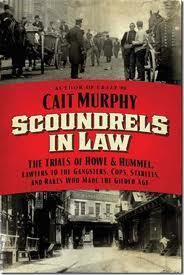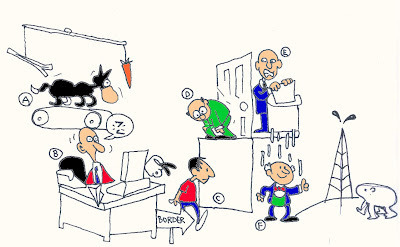Man Martin's Blog, page 192
July 23, 2012
David and Goliath with Footnotes
From First Samuel, 17
 The PhilistinesDavid chose five smooth stones from the stream, put them in the pouch of his shepherd’s bag [Oh yeah, David was a shepherd. I forgot to mention that part.] and, with his sling in his hand, approached the Philistine. And the Philistine cursed David by his gods. “Come here,” he said, “and I’ll give your flesh to the birds and the wild animals! ”
The PhilistinesDavid chose five smooth stones from the stream, put them in the pouch of his shepherd’s bag [Oh yeah, David was a shepherd. I forgot to mention that part.] and, with his sling in his hand, approached the Philistine. And the Philistine cursed David by his gods. “Come here,” he said, “and I’ll give your flesh to the birds and the wild animals! ”
Published on July 23, 2012 02:25
July 22, 2012
Another Idea Guaranteed to Make You a Million
 If you read this blog regularly, every so often you will come across an idea guaranteed to make you a million dollars.
If you read this blog regularly, every so often you will come across an idea guaranteed to make you a million dollars.This is one of those times.
This frankly is not my own, but was suggested to me by Lee Abbott, author of All Things, All at Once, New and Selected Stories, which has won raves from the New York Times Book Review and Booklist, a marvelous funny book, and a dandy gift for all occasions.
Here's the idea.
You know how at State Fairs and such there's a big demand for fried foods. Perhaps funnel cakes were the progenitors, and lest we forget, donuts (made God's way) and beignets (I don't know any state fairs that serve beignets, but I think it's a fine idea) and of course there are any number of fried meats from chicken to alligator tail. Lately, an with ever-increasing velocity of innovation, the inventive fry cooks of America have been introducing the public to a widening field of fried possibilities. Some, in my humble opinion, merely for the novelty of saying they have done so. Fried pickles, as I see it, are not a complete success. Sometimes, to overcome the sheer technical difficulty. Fried cream corn has yielded enormous beneficial results to humanity, in addition to fried Kool-Aid, fried Coca-Cola, fried Ice Cream. Some seem a defiant gesture to the AMA, such as the fried cheeseburger: a fully-loaded 1/2 lb bacon cheeseburger, dipped in batter and dropped in hot oil.
Achieving untold wealth coming up with the next fried novelty is a fool's errand, the fickle taste of the American public has seen to that, but...! Note that many of these fried foods are served on sticks - corn dogs, of course, and at the moment I'm stumped for another example, but we all know that "on a stick" is as common a suffix in this era as "a la mode" was in another.
Here then, is Lee's idea: the stick itself should be made of some edible fried substance!
The inventor of the edible stick will benefit no matter which way the winds of fried food fashion blow: should fair-goers in the future eat fried armadillo or fried human flesh, they will still need a handy stick to tote it on. This I think is as obvious and natural an innovation as the waffle cone. Many foods seem ready-made, especially in the meat category - Slim Jims, jerky - but perhaps an actual stick properly seasoned, battered, and deep-fried would be equally successful. Thing of the advertising dollars promoting mesquite-flavored whatever-the-hell-it-is. Why can't we just eat a straight piece of mesquite? I leave the details of the exact composition of the Fried Stick to the inventor, and perhaps the thing already exists; if so, my hat is off to you, sir or madam, who foresaw this great step forward in American cuisine.
If the fried stick's introduction does not meet with universal acclaim, well, I'll eat my hat. Fried.
Published on July 22, 2012 03:39
July 21, 2012
Slouching to Authorgeddon PT VIII
According to a study by Lulu, a provider of print on demand books, each year shows a rise in the number of people who have published a book, accompanied by a decline in the number of people who have read one. Extrapolating these figures suggests that in 2052, we will reach "Authorgeddon," when "the number of new number of new books published in America will first surpass the number of Americans who read even a single book each year."
So if it seems like everyone has written a novel these days...

So if it seems like everyone has written a novel these days...
Published on July 21, 2012 03:30
July 20, 2012
Starbucks to Serve Alcohol
Here's the menu.
In case you're interested.
Beers Tall Grande Venti Trenta Beer 9.75 11.55 12.75 15.05 Beer Mocha 10.25 11.95 13.05 15.75 Caramel Macchiato Beer 10.25 11.95 13.05 15.75 Skinny Caramel Macchiato Beer 10.25 11.95 13.05 15.75
White Wines
Cabernet Sauvignon Blanc 9.75 11.55 12.75 15.05 Cabernet Sauvignon Blanc Mocha 10.25 11.95 13.05 15.75 Caramel Macchiato Cabernet Sauvignon Blanc 10.25 11.95 13.05 15.75 Skinny Caramel Macchiato Cabernet Sauvignon Blanc 10.25 11.95 13.05 15.75

In case you're interested.
Beers Tall Grande Venti Trenta Beer 9.75 11.55 12.75 15.05 Beer Mocha 10.25 11.95 13.05 15.75 Caramel Macchiato Beer 10.25 11.95 13.05 15.75 Skinny Caramel Macchiato Beer 10.25 11.95 13.05 15.75
White Wines
Cabernet Sauvignon Blanc 9.75 11.55 12.75 15.05 Cabernet Sauvignon Blanc Mocha 10.25 11.95 13.05 15.75 Caramel Macchiato Cabernet Sauvignon Blanc 10.25 11.95 13.05 15.75 Skinny Caramel Macchiato Cabernet Sauvignon Blanc 10.25 11.95 13.05 15.75
Published on July 20, 2012 03:32
July 19, 2012
Slouching To Authorgeddon Pt VII
According to a study by Lulu, a provider of print on demand books, each year shows a rise in the number of people who have published a book, accompanied by a decline in the number of people who have read one. Extrapolating these figures suggests that in 2052, we will reach "Authorgeddon," when "the number of new number of new books published in America will first surpass the number of Americans who read even a single book each year."
So how do you attract readers if everyone's an author?
Published on July 19, 2012 03:22
July 18, 2012
Truth Is Stranger (A Sort of Book Review)
 It's sad times indeed when the most entertaining thing a fiction writer can find to read is nonfiction. This is the situation in which I recently found myself. Having just finished Nabokov's short stories (which seem to be arranged in chronological order and are like sitting down with an enormous basket of warm sweet plums) I started a highly-praised and very promising title that had been short-listed for the Pulitzer. I will not name the book - better and wiser readers than I loved it evidently, and what would be the point of advising people not to read something? - but to say I was less than thrilled would understate my disappointment by a wide margin.
It's sad times indeed when the most entertaining thing a fiction writer can find to read is nonfiction. This is the situation in which I recently found myself. Having just finished Nabokov's short stories (which seem to be arranged in chronological order and are like sitting down with an enormous basket of warm sweet plums) I started a highly-praised and very promising title that had been short-listed for the Pulitzer. I will not name the book - better and wiser readers than I loved it evidently, and what would be the point of advising people not to read something? - but to say I was less than thrilled would understate my disappointment by a wide margin.So instead I picked up Scoundrels in Law by Cait Murphy and at once found myself in a thoroughly hilarious picaresque of brothels, Broadway, crooked cops, and murder, set in the Gilded Age of Tammany Hall when an enterprising gangster could still break out of Sing-Sing and run away to Mexico and Hearst and Pulitzer were slugging it out for readership in the Yellow Press. At the center of this maelstrom stood the Mutt-and-Jeff duo of Howe and Hummel, two lawyers who must have been the genesis for every joke about lawyers you ever heard, who would stop at nothing - nothing - to get a client off, and who - as outrageous as they were - you can't help admiring and wishing you had around to represent you.
Written with a lively voice, Scoundrels in Law ultimately has faith in its own material, and lets the stories and the characters speak for themselves. Though nonfiction, the story is largely farce, but with a sad comeuppance at the end and a little moral for those who care to learn it - he who lives by quasi-legal finagling, dies by quasi-legal finagling. The book also ends with a brief meditation on the transience of fame - two men who were a byword in New York for decades have sunk to obscurity, a fate which, Murphy notes, would not have saddened Howe and Hummel one bit, glorying as they were in the daily challenge of living by their wits. And making a very good living indeed.
Published on July 18, 2012 03:23
July 17, 2012
Slouching to Authorgeddon Pt VI
According to a study by Lulu, a provider of print on demand books, each year shows a rise in the number of people who have published a book, accompanied by a decline in the number of people who have read one. Extrapolating these figures suggests that in 2052, we will reach "Authorgeddon," when "the number of new number of new books published in America will first surpass the number of Americans who read even a single book each year."
So if it seems like everyone has written a novel these days, maybe they have.
Published on July 17, 2012 02:06
July 16, 2012
Mitt Romney's Finances
 Romney's Economic Stimulus Plan: Carrot and stick cause Mule (A) torun on treadmill, waking up sleeping Bank Regulator (B) who knocksover coffee, leading to coffee shortage causing Undocumented Alien (C)to return to Columbia for work. Puzzled Economist (D) stoops to observethis, bumping door. Hearing knock, nervous Lawyer (E) begins shreddingdocuments, causing what appears to be snowfall in July. BelievingGlobal Warming is at an end, environmentalist Congressman (F) gives goahead for drilling in Arctic, leading to cheap oil and jobs for everyone.A lot of nonsense and suspicion has been bruited about regarding Mitt Romney's finances, and while I don't claim to be an economist (actually, I do claim to be one) I think it's high time I stepped up and explained just what's going on.
Romney's Economic Stimulus Plan: Carrot and stick cause Mule (A) torun on treadmill, waking up sleeping Bank Regulator (B) who knocksover coffee, leading to coffee shortage causing Undocumented Alien (C)to return to Columbia for work. Puzzled Economist (D) stoops to observethis, bumping door. Hearing knock, nervous Lawyer (E) begins shreddingdocuments, causing what appears to be snowfall in July. BelievingGlobal Warming is at an end, environmentalist Congressman (F) gives goahead for drilling in Arctic, leading to cheap oil and jobs for everyone.A lot of nonsense and suspicion has been bruited about regarding Mitt Romney's finances, and while I don't claim to be an economist (actually, I do claim to be one) I think it's high time I stepped up and explained just what's going on.Say Romney saw a corporation with a value of a eighty-five zillion dollars, but which had a book value of a hundred zillion: well, he goes and borrows a hundred zillion against the equity in the company, buys it for eighty-five zillion, and is still left with fifteen zillion to invest elsewhere, and meanwhile he improves the company's economic performance by re-calibrating its fidubiary fiscal reserves and adjusting its year end, year-over-year, yearly annual year. And he takes all the Nutter-Butters out of the break room.
Fifteen zillion is then deducted from the company's pension fund to pay for long-distance phone calls and paper clips; however, this being a Tuesday, there's a rebate of five zillion which is given back to the pension fund minus a two zillion processing and handling fee retained by Bain, which means at the end of the fiscal day, the pension fund is only out twelve zillion dollars instead of fifteen. Bain having retained two zillion (remember that part?) 12+2=14, leaving another zillion out there which nobody except Romeny can figure out where it went.
Surely, this is clear to anyone.
With the zillion-dollar profit, Romney fills four glass jars:
1. On-going capital expenditures.
2. Foreseeable unbelievable receivable shortfalls
3. Money lost under couch cushions and in the bottom of the sock drawer
4. Off-shore Cayman island accounts
5. Off-shore Swiss-bank accounts
6. Collectible "Donald Trump" Bobble-heads
7. Off-planet accounts on one of the moons of Pluto, yet to be named
8. Nutter-Butters for personal supply
I hope this settles matters and we can move on now.
Published on July 16, 2012 03:15
July 15, 2012
Slouching To Authorgeddon: PT V
According to a study by Lulu, a provider of print on demand books, each year shows a rise in the number of people who have published a book, accompanied by a decline in the number of people who have read one. Extrapolating these figures suggests that in 2052, we will reach "Authorgeddon," when "the number of new number of new books published in America will first surpass the number of Americans who read even a single book each year."
So if it seems like everyone has written a novel these days, maybe they have.
Published on July 15, 2012 04:20
July 14, 2012
Happy One Hundredth Birthday, Woody Guthrie

When I first heard Woody Guthrie's music - I would have been seven or eight, maybe - he was still alive, living out the last ten years of his life institutionalized with Huntington's, a horrible progressive disease that robbed him of control of both his mind and body. Dylan visited his idol frequently in the hospital, but although Guthrie at first seemed to like his young admirer, he sometimes also raged at him, and supposedly on the last visit, did not recognize him.
But I was writing about how I came to know Guthrie's music. My mother had a set of Smithsonian records with the strangest and most wonderful music: "Ol' Groundhog," "The Bold Fisherman of Plimlico," Leadbelly, Doc Watson, and Woody Guthrie. My sister Nettie and I would listen to these in Fort Pierce, Florida when we got tired of making creepy-crawlers and watching a bizarre little slide-show device that played us enormously abridged and dumbed-down versions of Jane Eyre and The Count of Monte Cristo. (Do you remember those, Nettie?) We learned a lot of the songs without even knowing what they were about, except there was an unmistakable wry wit, even a kid could get:
California is a garden of Eden, a paradise to live in or see,
But believe it or not, you won't find it so hot, if you ain't go the do-re-mi.
Guthrie's singing style also made Nettie and me smile - he refused to dress up a song with any vocal antics. In his most famous song, he doesn't draw out the last syllable of "New York Island" to make it rhyme with "this land is my land," but just pronounced it plain flat "eyelin'." Ditto, for "Gulf Stream water." Water didn't get any additional emphasis or drama because it came at the end of the line, "wah-ter," he pronounced it the same way any Oklahoma boy would asking for something to drink: "wadder."
A couple of years later, living in Sandersville, Georgia, I found "This Land is Your Land" printed in my textbook, and was surprised to discover it even had an author, because I'd assumed it was a song that had always existed, or at least that it was coeval with the founding of the nation, that Washington and Adams had commissioned it the same day they signed the Declaration of Independence. It was printed alongside "God Bless America," another song I learned is of surprisingly recent origin, which had famously been belted out by Kate Smith who walloped every note like a singing steamroller. I liked that song too, as different as it was from Guthrie's. Both very patriotic, but neither was really suited to fireworks. With Guthrie, skyrockets would have been incongruous. With Kate Smith, superfluous.
About this time, folk music was a hot ticket. My mother played us Odetta, Pete Seeger, and more Doc Watson. My brother Homer had some Kingston Trio albums, and Nettie and I were big into Peter, Paul, and Mary. I never got Dylan, and I still don't get him. I didn't like Johnny Cash until much later. Somewhere around Joan Baez, I began to lose interest in folk music. Baez had the voice of an angel, but she lacked the humor that made me like Peter, Paul, and Mary - my favorite songs of theirs were always minor gems like "I'm in Love with a Big Blue Frog." Looking back on it, Baez marked the arrival of political correctness which is a poison tablet. (Guthrie's son wrote an interminable but hilarious song, "Alice's Restaurant," which I also love.)
That's what I liked about Guthrie. He was successful, but he was still the outsider. Political correctness was represented by Kate Smith's anvil-chorus rendition of "God Bless America." You could tell by the way Guthrie didn't tart up his singing by stretching that last syllable of "island," he was genuine, even sincere, but he wasn't earnest.
Here's a bit of out-and-out socialism from "This Land is Your Land," but delivered with such a grin and a wink, even the man who posted the property would have to smile. You can just picture Guthrie singing it, with a cigarette hanging on his lower lip, his cap pushed back, that leprechaun face:
There was a big high wall there that tried to stop me;Sign was painted, it said private property;But on the back side it didn't say nothing;That side was made for you and me.
Woody Guthrie, we still love you. Happy birthday.
Published on July 14, 2012 03:16



